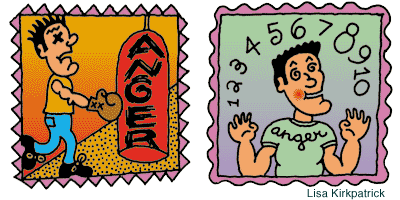
Better to Simmer than to Vent
Mike, who is 27, used to handle his anger by screaming and breaking things. "When someone said something nasty," he recalls, "my tendency was to react and yell."
But over the years, he became aware that his actions did nothing to relieve his anger. Instead, they prolonged it. "I felt the heat and disruption of anger for a long time afterward," he says. "Then I realized that I had a choice in the way I reacted." Now he takes deep breaths, focuses on his breathing, and thinks about why he is angry.
"In the short term, it's easier to lash out and hurt people," he notes. "But a long-term solution -- soothing my anger and looking into it deeply -- makes more sense. It takes more effort, but it's worthwhile. Anger is a destructive force. It eats you up inside," he says.
Mike's experience with anger is common, but his intuition about the dangers of aggressively venting has only recently been confirmed by science. Iowa State University researchers found that, contrary to popular belief, blowing off steam is not a good way to defuse anger. In fact, they say, venting anger is downright destructive -- it actually increases hostility.
According to the lead author of the study, psychologist Brad Bushman, Ph.D., our society advocates the "catharsis theory," which says aggressive behavior is an effective way to reduce anger and aggressive feelings. There is virtually no scientific evidence to support the theory, he points out.
"The catharsis theory is worse than useless," Bushman says. "A theory is useless if it doesn't work. It is worse than useless if it produces harmful effects. Expressing anger produces harmful effects -- it increases aggression."
Bushman's findings, published last year in the Journal of Personality and Social Psychology, involved two studies in which 710 male and 717 female undergraduates were asked to write a short essay. In the first study, students who received negative comments on their essay and read a bogus article touting the benefits of venting anger expressed the highest desire to hit a punching bag. In the second study, participants either hit the punching bag or sat still for two minutes and did nothing. They then played a competitive computer game in which they could inflict a blast of noise at varying durations toward an unseen opponent.
If venting is a valid way to dissipate anger, then hitting the punching bag should have dissipated the students' anger. But it didn't. Instead, researchers noted that it increased the students' anger. Participants who had hit the punching bag were more aggressive during the computer game than those who had done nothing; after 25 trials of the game, they were still blasting their "opponent" in an attempt to get rid of their anger.
"Expressing anger doesn't work, even among people who are led to believe it does," says Bushman. "It just teaches them to respond to frustrating situations by hitting, kicking, screaming, and swearing."
"People vent because they think it will make them feel better," he adds. "When it doesn't, they get even more frustrated and angry, and keep lashing out in a vicious circle of continued or even escalating aggression."
Neither holding in anger nor letting it out aggressively is healthy, notes Bushman. A better way to manage anger, he says, is to calm down and then try to resolve the problem. He suggests delaying an angry response by taking a "time out." Go for a walk or count to 10. If you are really angry, count to 100, he advises. "Take a deep breath, or listen to calming music," Bushman suggests. "Distract yourself by doing something incompatible with anger, like making love, watching a comedy, or helping someone in need."
If, instead of lashing out and prolonging the anger, you turn to something more pleasant, you'll be calm in no time. "These techniques are great for dealing with daily hassles, such as getting cut off in traffic or receiving a dirty look," Bushman points out. For problems that are bigger than road rage, taking a deep breath may not be sufficient, he notes, but there's still a better solution than blowing your top. Bushman advises combining everyday calming techniques with simply "talking about the situation" in order to improve things.

